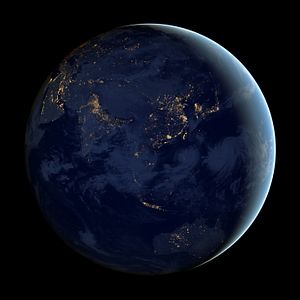In his 1904 paper “The Geographical Pivot of History,” Halford Mackinder warned that China could one day threaten to upset the global balance of power by organizing the resources of Eurasia and building an invincible sea power. Today, China’s cooperation with Russia, its Belt and Road Initiative, its growing presence in the Indian Ocean and Africa, and its burgeoning sea power are evidence of Mackinder’s prophetic powers.
Mackinder understood that Eurasia is the “great continent” that contains most of the world’s people and resources, and when Eurasia is geographically linked with Africa it potentially combines incomparable resources and insularity — the two key elements of global power. In Democratic Ideals and Reality (1919), Mackinder called the Eurasian-African landmass the “World-Island.”
What did Mackinder mean by “World-Island?” It was a concept inspired by his understanding of the relationship between geography and history. Mackinder has often wrongly been described as a theorist or advocate of land power over sea power. In truth, he understood the complementary nature of land power and sea power. He wrote that effective sea power required the resources of a strong land base. There is no stronger land base than the World-Island of Eurasia-Africa. The Mediterranean, he understood, was effectively an inland sea and the Sahara would no longer impede effective communications between Eurasia and Africa. Strategists, Mackinder cautioned, “must no longer think of Europe apart from Asia and Africa. The Old World has become insular, or in other words a unit, incomparably the largest geographical unit on our globe.”
“What if … the whole World-Island or a large part of it,” Mackinder asked, “were at some future time to become a single and united base of sea-power? Would not the other insular bases be outbuilt as regards ships and outmanned as regards seamen? Their fleets would no doubt fight with all the heroism begotten of their histories, but the end would be fated.” A 21st century Mackinder would add air, space, and cyber power to the equation.
North America, South America, Britain, Japan, Australia, and lesser islands, Mackinder wrote, are mere satellites of the World-Island. “There is one ocean,” he explained, “covering nine-twelfths of the globe; there is one continent — the World-Island — covering two-twelfths of the globe; and there are many smaller islands … which together cover the remaining one-twelfth.”
Mackinder’s brilliant understanding of the relationship between geography and history enables today’s strategists to grasp the strategic implications of China’s Belt and Road Initiative, cooperation with Russia, diplomatic and economic inroads into Africa, and growing sea power.
In one of his lesser-known works The Nations of the World (1911), Mackinder urged the world’s statesmen to “think of the competing nations of to-day in their geographical setting,” but cautioned that “it is futile to treat them statically [because] they are each of them waxing and waning in many different ways.” Our world, he wrote, is of “varied scene and incessant change.”
When Mackinder looked at China’s place in the world in 1911, he foresaw that “Whenever this great people decides to take full advantage of … resources, … industry, communications and defense, it is inevitable that after one or two generations China will count among the … Great Powers of the world.” That has happened and its geopolitical implications are vast.
Whether Chinese leaders view the world in Mackinderesque terms is beside the point. Their diplomatic, economic, and military moves throughout Eurasia-Africa and its littoral raise the specter of global geopolitical imbalance.
Francis P. Sempa is the author of Geopolitics: From the Cold War to the 21st Century and America’s Global Role: Essays and Reviews on National Security, Geopolitics and War. His writings appear in The Diplomat, Joint Force Quarterly, the University Bookman and other publications. He is an attorney, an adjunct professor of political science at Wilkes University, and a contributing editor to American Diplomacy.

































